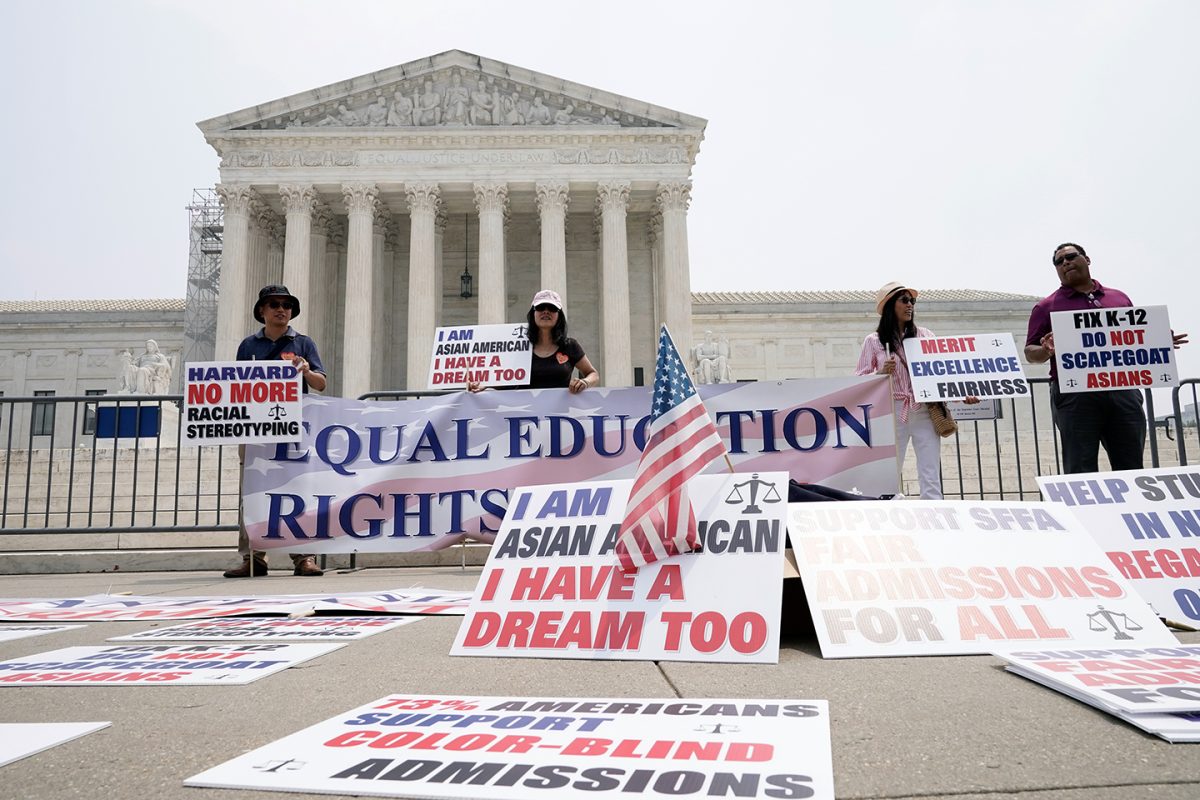The Supreme Court is currently weighing whether affirmative action, a range of policies that take race (among other characteristics) into consideration during admissions, should be prohibited. Many experts believe that the Supreme Court’s conservative majority will rule against affirmative action. The decision, which will be released in June of this year, has far-reaching implications for the future of college admissions in the United States.
Affirmative action, in its current iteration, emerged in the middle of the Civil Rights movement when President John F. Kennedy signed an executive order 1961, decreeing, “The contractor will take affirmative action to ensure that applicants are employed, and that employees are treated during employment, without regard to their race, creed, color, or national origin.” Since then, and since Title VII of the 1964 Civil Rights Act, any employers affiliated with, or receiving funding from, the federal government must “document their affirmative action practices and metrics,” according to the Legal Information Institute at Cornell University, and prove that they are not discriminating against prospective employees or college students on the basis of race, sex, religion, national origin, creed, age, or ability. Consequently, many universities have created a series of programs and policies designed to ensure equity in the admissions process and garner a diverse student body.
These affirmative action practices have fallen prey to legal challenges and Supreme Court precedents over the last five decades. In 1978, the Supreme Court ruled in Regents of the University of California v. Bakke that the use of racial quotas for admissions is unconstitutional. In 2003, the Supreme Court ruled in Gratz v. Bollinger that the University of Michigan’s point system for evaluating the candidacy of undergraduate applicants, in which admissions personnel “awarded” twenty points to “underrepresented minority” applicants, was unconstitutional. In 2016, however, the Supreme Court ruled in Fisher v. University of Texas that the University of Texas’s race-conscious admission program, which automatically accepted all students who graduated in the top ten percent of their high school classes, was protected by the Equal Protection clause of the fourteenth amendment.
Contrary to popular belief, and contrary to what these legal challenges suggest, affirmative action does not significantly influence the college admissions process, or at least not as much as its opponents believe. Most colleges do not use affirmative action, and the selective colleges that do take race into consideration do not do so to a major extent. According to a 2019 survey by the National Association for College Admission Counseling, more than half of colleges surveyed said that race and ethnicity have no impact on the admissions process.
In fact, studies show that the impact that race has on college admissions is minor in comparison to the impact of being a legacy student. Legacy students are ones whose parents attended the college in question. In fact, it was found that legacy students are a staggering 45% more likely to get into a highly selective college or university than non-legacy students.
Harvard and the University of North Carolina — the two universities at the heart of the current Supreme Court case on affirmative action — do take race into consideration, which has spurred the current lawsuit against affirmative action. The lawsuit was brought forth by the Students for Fair Admissions, a conservative political organization, which argues that affirmative action policies discriminate against Asian students. While this is a common claim made by affirmative action opponents, a poll conducted by AAPI Data, a nationally recognized publisher of demographic and policy research centered on Asian American communities, found more than 70% of Asian-Americans supported affirmative action policies as of 2016.
It is clear that this decision will have an impact on many students. According to Angel Perez, the chief executive for the National Association for College Admission Counseling, speaking to the New York Times, the end of affirmative action could lead to “a decline in students of color attending college before we see an increase again. We will be missing an entire generation.”
These sentiments are shared by current college students. Taryn Vandiver, student at Elon University, claimed in an opinion piece on affirmative action’s necessity, “I have learned that though things are much better, affirmative action helps to continue to advocate for minorities in the college admissions process. I believe it will allow for a greater concentration of minorities and students of color, allowing for a more diverse and inclusive college experience.”
This same opinion appears within Fort Hamilton High School as well. London Trammell, a sophomore in Fort’s law program, believes in the necessity of affirmative action. “It gives these underrepresented groups an opportunity which they haven’t been able to have since the United States was established,” Trammell said.
The end of affirmative action is one that many feel will clearly lead to an immense change in the higher education system of the United States. And while many students and scholars are worried about the consequences of this decision, we can only wait to see what the Supreme Court will end up ruling and what will occur as a result.






























